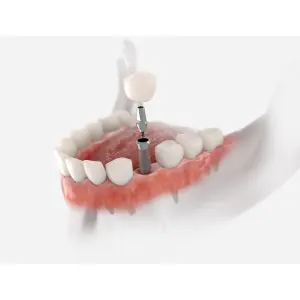
Patient Info
Dental Implants
Cosmetic Dentistry
General Dentistry
When it comes to permanent tooth replacement, dental implants are an excellent choice. But how long do dental implants last? The factors that contribute to the longevity of dental implants depend largely on the lifestyle and overall oral hygiene maintained by the patient. In the last several years, dental implant technology has progressed to such an extent that implant failures resulting from rejection or malfunctions have essentially disappeared from the past. Preexisting medical conditions, diseases, and implant misuse are more likely factors that cause an implant to fail.
Generally, a dental implant intends to remain a permanent fixture in your mouth. Trusted sources report a success rate of 90 to 95 percent for dental implants over 10 years.
A dental implant procedure replaces the missing teeth. It consists of a titanium post, which is placed into the jawbone under the gum line surgically. It acts as an artificial tooth root, providing a sturdy foundation for dental crowns and tooth replacement. These tooth implants look, feel, and function like natural teeth, restoring the smile's appearance and functionality.
To understand the question, "How long do dental implants last?" let's outline the three main components of a dental implant:
The exposed abutment and crown are typically more prone to damage than the implant itself.
When adequately maintained with proper brushing and flossing, the implant can endure a lifetime, provided the patient undergoes regular dental check-ups twice a year. However, a crown typically lasts around 10 to 15 years before regular wear necessitates replacement, although exceptional dental care could prolong its lifespan beyond 15 years.
Moreover, the location within the mouth influences the expected durability of a dental implant. Implants positioned at the back of the mouth endure more pressure from chewing, potentially leading to quicker failure compared to implants situated near the front of the mouth.

Here are some simple steps you can take to help dental implants last longer:
Mini dental implants are mini versions of traditional dental implants. They're often used in situations where there's not enough space or bone density for regular implants. These mini-implants consist of a titanium post that's inserted into the jawbone to support crowns or dentures.
As for how long they last, it's essential to note that mini dental implants have a slightly different lifespan compared to standard implants. While traditional implants can last a lifetime with proper care, mini dental implants typically have a shorter lifespan, usually ranging from 5 to 10 years.
However, their longevity can vary based on factors like oral hygiene, bone density, and overall health. Regular dental check-ups and maintenance can help increase the lifespan of mini dental implants.
So, if you're considering mini dental implants, it's essential to discuss their longevity and maintenance with your dentist to ensure they're the right option for you.
Dental implants are a good option for many people, but they're not suitable for everyone. Generally, individuals with good overall health, adequate bone density in their jaw, and healthy gums are good candidates for dental implants.
However, certain factors may affect eligibility for dental implants, such as:
Consult with a dentist or oral surgeon to find out if dental implants are the right option for you. They can assess your oral health, discuss treatment options, and assist you in making an informed decision about restoring your smile with dental implants.
"How Long Do Dental Implants Last?" is a question many individuals ponder when considering dental restoration options. With proper maintenance and regular dental check-ups, it can last a lifetime, offering a durable and natural-looking solution for missing teeth.
It's crucial to prioritize oral hygiene and follow the recommendations provided by your dentist to ensure the longevity of your dental implants. By taking proactive steps to care for your implants, you can enjoy the benefits of a healthy and confident smile for years to come.
Ready to explore the possibilities of dental implants? Springhill Dental Health Center, located on Springhill Ave, AL, is here to help. Whether you're a new patient or seeking expert dental care, you can schedule an appointment today. New patients can call (251) 265-7808 while existing patients can reach us at (251) 343-1521. Let's embark on the journey to restore your smile and enhance your dental health together!
With proper care and maintenance, your implants should last a lifetime. Regular dental check-ups and adhering to recommended oral care routines can help maximize the lifespan of dental implants.
Yes, dental implants can fail, although it's not very common. The failure can occur for various reasons, such as infection, bone loss, peri-implantitis, implant overload, poor osteointegration, etc.
Dental implants can last about 25 years with proper care, surpassing the average lifespan of bridges and dentures, which is around 10 years.
My visit was incredible. I had my “All on Four” appliances cleaned, and it was a painless and thorough experience. Dr. Scott and all his staff are very friendly. During the cleaning, Mary was gentle and let me know everything she was doing and how it would feel. She gave me tips on how to clean my implants/appliances better and gave me a small brush to do the underside more effectively. Dr. Scott and Mary suggest cleanings take place every 3 months so I will be back in December.

Dr. Byron Scott is a highly-trained and accomplished dentist. He attended The University of Alabama School of Dentistry and subsequently completed numerous Advanced Studies and Trainings. Dr. Scott is Board-Certified by The Academy of General Dentistry and has earned Mastership status (MAGD), an honor shared by only 1% of dentists. He has numerous memberships and associations, including Diplomate status with The American Board of Oral Implantology (D-ABOI) and The International Congress of Oral Implantologists (D-ICOI). Overall, Dr. Scott has dedicated his life and career to helping patients improve their oral health through expert dentistry. His goal is to help each patient keep their smile healthy, attractive, and comfortable for the duration of their lifetime.
